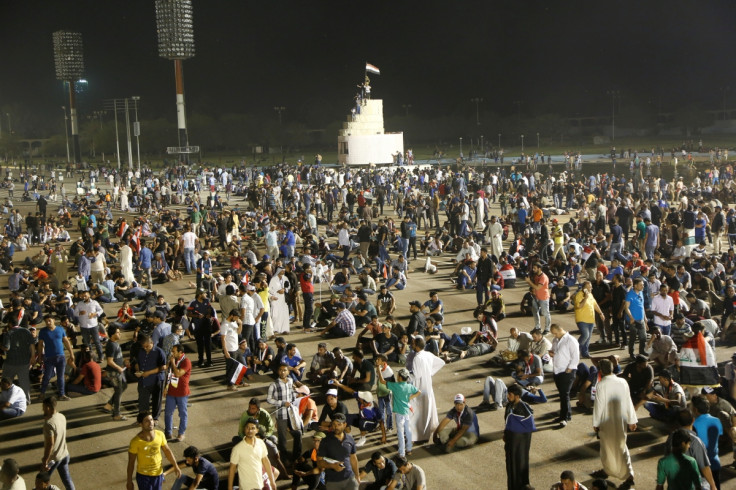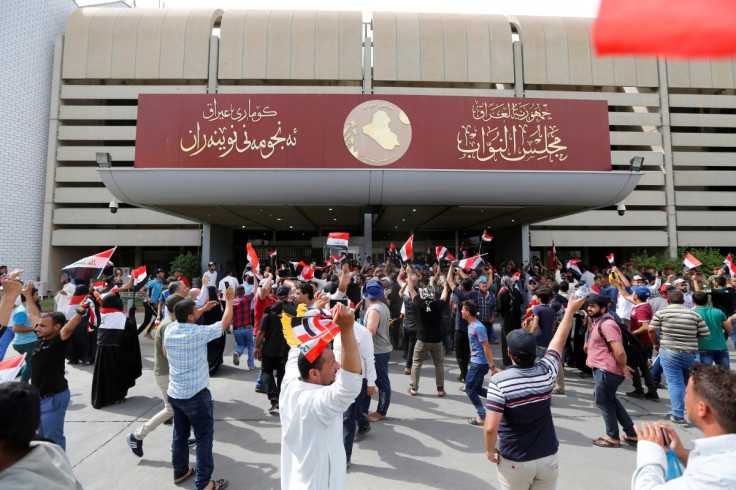Iraqi PM orders arrest of Shi'ite protesters occupying Tahrir Square after storming parliament

Iraqi Prime Minister Haider al-Abadi has ordered the arrest of hundreds of Shi'ite Muslim protesters who stormed parliament in Baghdad. Hundreds of activists aligned with powerful Shia Muslim cleric Muqtada al-Sadr camped out overnight on the streets of Baghdad after storming parliament.
A State of Emergency has been declared by the Iraqi government after the demonstrators scaled Green Zone walls and took over the House of Representatives. The PM said those who attacked police in the capital "and inflicted damage on public facilities" should be held by the police.
On Tahrir Square, crowds were seen occupying lawns in makeshift tents Sunday 1 May. The protesters are frustrated with delays in approving a new non-partisan government and the continuation of, what they believe, is a political system that encourages corruption.
Earlier this week, hundreds of thousands of people protested at the Green Zone walls as the government failed to ratify the al-Abadi-proposed cabinet reshuffle. But on Saturday 30 April, large sections of the wall were destroyed as hundreds ignored pleas to stay in designated protest areas.
As people breached the wall, tear gas was fired by government troops and the UN said Western diplomats based inside the Green Zone were trapped inside. Reports from the Iraqi capital said SWAT teams and presidential guard forces trying to keep the protesters from crossing a bridge close to the US embassy.
Shia cleric Muqtada Sadr, who has been supporting the reforms, has represented himself as the voice of the people by demanding an end to corruption in Iraq – but holds no political office. Powerful parties within parliament have refused to approve the landmark change, which would see technocrats taking over government positions. This latest demonstration was triggered by MPs failing to convene in sufficient numbers for a vote on the new cabinet.
Abadi, who came to power in 2014 on a remit to stamp out corruption and ease tensions with the Sunni Muslim minority, has called on demonstrators to leave the Green Zone and return to designated protest areas outside the four-mile perimeter. The Iraqi government has candidates with a mix of party and religious loyalties and the country ranks 161st of 168 on Transparency International's corruption perceptions index.
"Either corrupt (officials) and quotas remain or the entire government will be brought down and no one will be exempted," Sadr said according to the BBC. As the protesters took over the parliament stones were thrown at cars thought to be carrying ministers.

The Saraya al-Salam militia, Sadr's private army, is said to be keeping peace in the square. The force was formed in June 2014 by Sadr in response to the Islamic State's (Isis) territorial gains in Iraq.
The 42-year-old is a controversial figure in the country, with al-Salam blamed for the torture and killing of thousands of Sunnis in the sectarian carnage of 2006 and 2007 whilst Sadr was in exile in Iran. The Najaf-born Sadr has also been subject to an arrest warrant for the murder of a rival cleric.
© Copyright IBTimes 2025. All rights reserved.






















